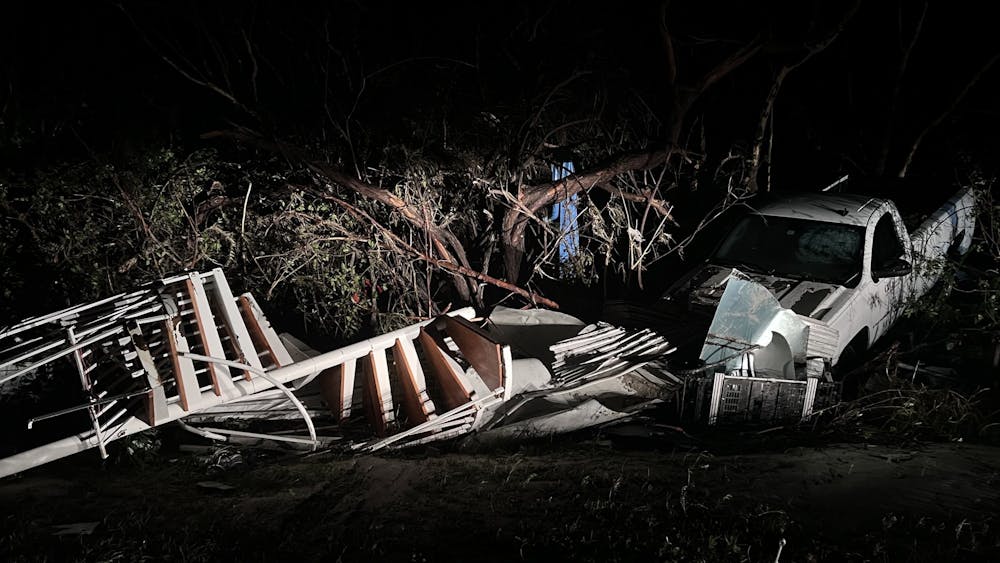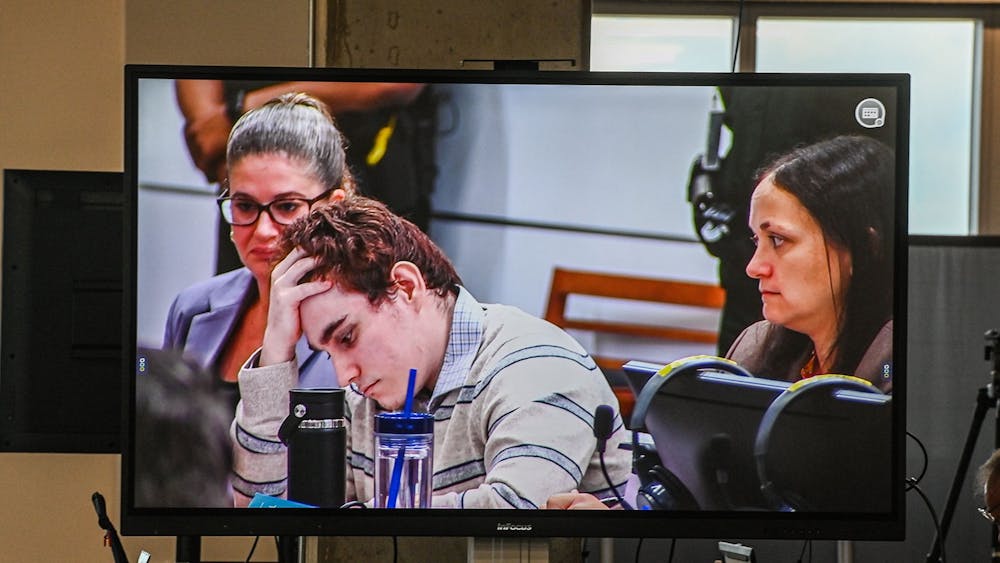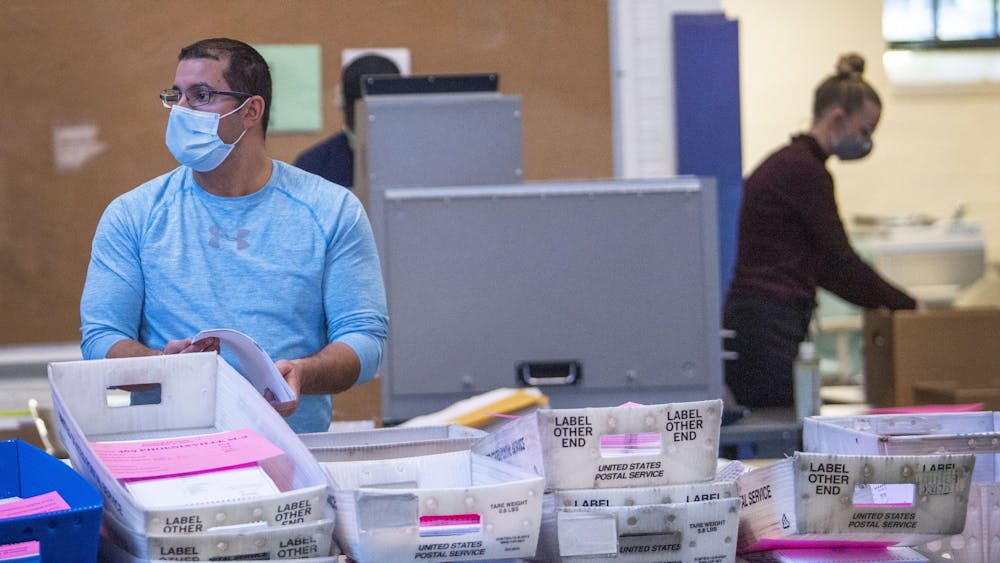FORT MYERS, Fla. — On the vacation island resorts of Sanibel and Captiva, rescuers flew in on helicopters because the roads from the mainland of Southwest Florida had collapsed into San Carlos Bay. To the south, Fort Myers Beach, once a lively town center of fish restaurants and bars, was reduced to a debris field of concrete blocks, shredded wood and broken tiles, its pier stripped down to a skeleton of pilings.
In Orlando, Hurricane Ian’s winds carried less of a punch, but rain came down with unrelenting fury, flooding popular lakes, submerging streets neck deep, and forcing dramatic rescues for motorists trapped in their cars.
The snapshots of devastation emerged as Florida began to assess the damage caused by Ian, which made landfall in Southwest Florida with punishing winds of 155 miles per hour, churning across the state with torrential rains before emerging into the Atlantic Ocean as a tropical storm on Thursday afternoon.
Over 2 million customers in Florida were without electricity. Governments and insurance companies were bracing for billions in damage — and years of rebuilding. The death toll was at least 12, according to police departments, but was expected to rise, with President Joe Biden fearing Ian “could be the deadliest hurricane in Florida’s history.”
Families took to social media and called police for help finding their loved ones, as rescuers continued searching for the missing. And thousands were displaced from their homes.
Cole Mazza, a 25-year-old bartender, managed to escape his submerged Fort Myers home with his sister’s ashes in an urn and his two terrified cats — Dolce and Gabbana — stuffed into a carry-on suitcase. He nearly drowned swimming through fast-moving 6 feet of water, eventually making it to a neighbor’s house on stilts. “Like a scene out of Titanic,” he said.
His cats were lucky. His home was not.
“Totally flooded and destroyed,” he said. “I lost everything.”
Related: [‘Help is on the way’: DeSantis says hundreds have called 911, rescue efforts underway]
A Category 4 storm, Hurricane Ian made landfall Wednesday afternoon at Cape Cayo, a small island north of Captiva, then again north of Punta Gorda on the mainland. With winds of 155 miles per hour — nearly a Category 5 — the storm battered Southwest Florida, tearing buildings off their foundations, submerging streets and yanking boats from their moorings.
Early Thursday morning, once the winds subsided, search-and-rescue teams, firefighters, police officers and public-works crews fanned out into Southwest Florida. Air crews from U.S. Coast Guard and National Guard helicopters scoured neighborhoods, in particular on the cut-off barrier islands, looking for trapped survivors, and teams had made 740 confirmed rescues, Gov. Ron DeSantis said at a Thursday evening news conference.
More than 800 urban search-and-rescue team members fanned out across the state as National Guard members launched “assessment missions” in the hardest-hit counties: Lee, Collier, Charlotte, DeSoto and Sarasota. The Florida Division of Emergency Management was readying food, generators and water pumps, as well as 3.5 million meals and 1.8 million bottles of water.
At least two health care facilities in Southwest Florida were also being evacuated, DeSantis said Thursday morning. Biden had also declared affected Florida counties as disaster zones, allowing federal aid and resources to flow into the hardest-hit areas.
At the Next Level Church in Fort Myers, pastor Matt Keller and volunteers were bustling to launch a makeshift relief center, even without electricity in the building. “We’ve got several semi-trucks coming this way as we speak,” Keller said during a cellphone interview from the Next Level Church’s main complex about 12 miles northeast of the coast. “The purpose is to get water and meals to as many people as possible.”
By Friday morning, Next Level is expected to transform into a hub for distributing supplies from one of the Miami area’s leading relief groups, Global Empowerment Mission, run by former nightlife mogul Michael Capponi. “We’ve already sourced 10,000 mattresses from another nonprofit. They’re in North Carolina and we’re going to be trucking them down here,” Capponi said.
Power crews from Florida Power & Light, and other utility companies, were also streaming into Southwest Florida. In some cases, they’ll be repairing damage. In the hardest-hit counties, the whole grid will have to be rebuilt.
“Lee and Charlotte are basically off the grid at this point,” DeSantis said during a Thursday morning briefing.
Even though many roads are open in Southwest Florida, officials urged people to refrain from sightseeing.
“Do not come in and tour the area for damage,” said Kevin Guthrie, the director of Florida’s Division of Emergency Management. “We have 20,000 (or) 30,000 responders coming into (the) area that need access to those roads. Stay at home.”
Some 100 engineers were also deployed to inspect bridges, like the causeway connecting the mainland to Sanibel Island, which collapsed at five sections, making passage possible only by boat. Exactly how many people remained stranded on the barrier islands was unclear. The mainland road leading to the causeway was folded up like an accordion and covered by debris, including a stray spiral staircase deposited by the winds into the brush next to a pickup truck.
“Our community looks like it’s been hit by a very large tornado,” Lee County manager Roger Desjarlais said at a Thursday afternoon press conference. “We have a lot of residents who have lost their homes.”
DeSantis said rescues had been made from Sanibel, but some people had declined to leave the island, even though services and supplies may be difficult for them to obtain because of the damaged causeway — that may need to be wholly replaced.
The road to Pine Island, another barrier island that was wrecked by Ian, was also destroyed.
“Right now you cannot get to Pine Island by vehicle,” Desjarlais said, adding: “I would never have thought that those bridges would fail the way they have.”
On Fort Myers Beach, another vacation island community south of Sanibel, video and photos posted on social media emerged showing wrecked remains of the downtown “Times Square,” where tourists usually eat fish, drink rum and buy ice cream. On Thursday, people picked through the piles of wood, concrete blocks and broken tiles.
One restaurant, Junkanoo Beach, appeared to have completely vanished, save for a large sign, broken in two. A large boat dubbed the Crackerjack was tossed onto a sidewalk like a toy, atop a smashed SUV.
“Times Square no longer exists,” said Matthew Stohr, who worked at the Tropical Grill and survived the storm on Fort Myers Beach. “Smashed to bits. There’s nothing left but debris. Everything will have to be rebuilt.”
DeSantis, speaking Thursday evening, called the damage “almost indescribable” and said a house had been lifted up and deposited in the middle of Estero Bay. “There were cars floating in the middle of the water,” DeSantis said.
Related: [‘It’s time to hunker down’: DeSantis urges safety as powerful Hurricane Ian nears coast]
In downtown Fort Myers on the mainland, boats that had been docked in the river sat in a jumble in the parking lot of Joe’s Crab Shack. Their turbulent journey ripped open hulls, snapped masts, severed engines. Scattered on the ground or hung up in the branches of fallen trees were rudders, anchors, railings, sails and seat cushions.
Tom Downs climbed over the wreckage next to the Caloosahatchee River, looking for his boat. Name: “Just Us.” Last seen at Dock C-2.
“I found all my friends’ boats but I can’t find mine,” said Downs, adding: “I’m afraid it sank. It was a 52-foot Jefferson motor yacht. I sailed it all the way down here from Minnesota in 2019. This was our first hurricane.”
People were also searching for their loved ones.
Karen and John Zuro, who live in a two-story home in Cape Coral, had been unaccounted for since about 4 p.m. Eastern time on Wednesday. Cell service in the area was knocked out, or limited. “They were in the eye of the hurricane, that was the last time we were able to reach them,” said their daughter, Kristin Zuro, of Colorado. “Their windows were already broken. The car was about to float away.
“I called into the local police department and they said they have 500 to 600 people to do wellness checks on.”
Luckily, Thursday evening, Karen Zuro managed to drive to a shopping plaza, where she got enough reception to call her daughter with the good news: They survived unscathed.
At the Tamiami Village mobile home park, daylight revealed that the storm shredded car ports, porches and in a few cases, front rooms of the homes. Insulation, shards of aluminum and roofs littered the roads. Roofs looked like chewing gum wrappers bent around light poles. The twisted metal frame of one car port was bent around itself like a pretzel.
Helen Louchart, a 75-year-old resident of the senior living community, had watched as winds lifted a Flagstaff Super Lite RV. “It didn’t roll over on the ground,” she said Thursday as she juggled a water bottle, hammer, wrench and a pill bottle in her arms. “The wind picked it up, turned it over and dropped it down,” she said.
Upstate, Ian also wreaked havoc on Thursday, even as it weakened to a tropical storm but nevertheless hammered portions of Florida’s central region with winds near 65 miles per hour and torrential rain.
In Apopka, about 20 miles northwest of Orlando, an uprooted tree toppled onto one family’s home, causing rain to seep into the cracked ceiling. A television reporter with WESH-TV rescued a woman whose car got trapped in floodwaters in Orlando, where officials said they were seeing “historic levels of flooding” with as much as 14 inches of rain.
In downtown Orlando, some streets remained completely flooded early Thursday afternoon, with garbage and debris strewn about and traffic lights out. Lake Eola, a popular attraction, completely overflowed its banks as the storm moved through. A neighborhood dog park was also underwater.
“It’s crazy,” said Jake Morris, a downtown Orlando resident who under a light rain surveyed the damage along with groups of other curious locals. “I’ve never seen anything like it.”
In Volusia County, between Orlando and the east coast, the sheriff’s office reported that a man died after he was discovered in a canal — he’d ventured out during the storm to drain his pool.
“This storm is having broad impacts across the state. Some of the flooding you are going to see — hundreds of miles from where this made landfall — is going to set records,” DeSantis said.






